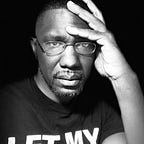Here, Let Me Show You!
The Ethics and Action Series, pt. 4
Two men are walking. One is blind from birth and the other has sight.
You want a glass of milk?” asks the one who can see.
“Well, describe milk for me,” says the one who’s blind.
“Milk is a white liquid.”
“Great. And what is white?”
“Well, for example, a swan is white.”
“Aha. And what is a swan?”
“A swan? It’s a bird with a long, curved neck.”
“Good, But what does curved mean?”
“Curved? Well, I’ll bend my arm, and you can feel it. Then you will know what curved means.”
The blind man carefully feels the other’s up-curved arm, and says:
“Terrific! Now I know what milk is!”
The point is rather obvious: Sometimes it is best to just experience a thing rather than describe it. Why not simply drink the milk rather than try to explain it?
Someone once said, “Don’t judge a man’s journey until you’ve walked a mile in his shoes.” Yet, people in society do that to returning citizens everyday.
The returning citizen’s journey from member of society to incarcerated citizen and/or convicted person then back to a member of society is often unduly judged. Their stories can be deemed mundane or unworthy of being told. Like the blind man, people think they have an understanding of the lives and experiences of returning citizens but in reality they don’t. Not even close.
But, could the experiences of returning citizens, the skills they’ve gleaned or lessons they’ve learned be of such value to our communities that citizens without felony convictions might discover that they were “blind” the whole time?
I believe it was Barbara W. Tuchman who once said, “Learning from experience is a faculty almost never practiced.” Cheeky, but true.
It is because we often forget to apply the lessons learned in life from the things we’ve encountered, endured, or survived that the “stock”, i.e. value, in experience goes way down. Once those experiences are used and the lessons applied, situations and circumstances- or at least how we see them- are almost sure to change. That’s why the Florida Rights Restoration Coalition is right to take its stance on the valued experiences and validated expertise of returning citizens.
What boldness is displayed when this organization says, “We believe that our loved ones and our communities can use our experiences and expertise to help create safer communities.”
That’s a strong ethic that requires action.
I’m a wordsmith. I love to study the derivation of words. Where did they come from? Who began saying this word? What’s its cultural background or significance? How is it used today?
I consider the word “experience” and think, “How’d that get there?” What guttural emotive was trying to be expressed when someone first said, “Experience!”?
Imagine what must have been happening in the world during the late 14th century when the word experience was first uttered. And to know that it was this term used to describe observation as the source of knowledge, actual observation, even an event that has affected one indelibly is all the more reason why it intrigues me.
Returning citizens have quite a few things they have observed as well.
From the traumas of childhood to the triggers developed from years of incarceration, these men and women have horrific experiences they can attest to. They also have stories of survival too. Beating the odds. Succeeding despite being told they never would. Getting a job in a field former felons heretofore were seemingly locked out of.
Experiences.
These same experiences help one to gain some expertise as well. Remember, we learn from our experiences. Or at least we should.
It is because of what returning citizens have been able to glean and gather, learn and obtain that we as a society must include them in every aspect of citizen life in this great democracy of ours.
The Prison Policy Initiative shares this on the experience of returning citizens,
“Our society has, in the name of being tough on crime, made a series of policy choices that have fueled a cycle of poverty and incarceration. We send large numbers of people with low levels of education and low skills to prison, and then when they leave just as penniless as they were when they went in, we expect them to bear the burden of legally-acceptable employment discrimination. The people in prison were, before they went to prison, some of the poorest people in this country. This makes it even more important that we make policy choices that can break the cycle of poverty and incarceration.”
Returning citizens can use the experiences and gleaned expertise on how to solve such issues. We must include their voices, their stories, and their contributions to breaking the very barriers that keep them perpetually locked out of the process that brings about real and lasting change in our communities.
After all, they come from, are a part of, and are returning to our communities.
